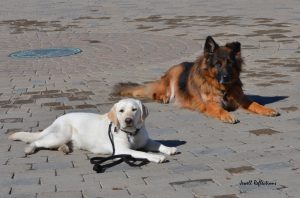BY FRAN JEWELL

Years ago, most people never bothered with socializing their dogs. As a kid, we never did, and yet our family dog was friendly with people and never ran off to play with other dogs. In fact, we were the only people on our block that had a dog! Now, dog owners have clearly gotten the message that socialization is extremely important to the development of their puppies.
Many behavior issues with dogs are often blamed on lack of socialization. What I see is that what should be socialization has become a free-for-all, wild and out-of-control experiences with other dogs that aren’t necessarily positive.
Dogs are pack animals. A pack is a clearly defined group of dogs that live together in cooperation for their existence and continuation. It remains consistent with members and relationships that are only changed by death or the birth of puppies. It is not playing endlessly and happily with every dog it sees. In fact, as a pack animal, many dogs are not at all comfortable with unknown dogs. They see unknown dogs as a threat to their existing pack (which includes their people). And yet, we humans are insisting that all our dogs learn to play with all the other dogs they see. We think pack means that they will love all the other dogs on the planet!
The reality is that most dogs cannot do this. We humans keep putting them in situations that are out of control and extremely uncomfortable for them, insisting they need to play. We see that as “socialization.” Yes, some dogs can do this, but many more cannot. The more pressure we put on our dog to be in uncontrolled dog-to-dog situations, the more often that goes wrong and what may have been merely uncomfortable feelings become aggression. It is not improved; it is worsened.
What socialization SHOULD be is a controlled environment where each dog can slowly make acquaintance. No dog should be allowed to run up to another and “mug” the other in the name of being friendly. Imagine yourself in an elevator with all strangers, when three of the strangers put their arms around you, hugging and kissing you! It would be an invasion of your personal space and NOT socially acceptable.
“Oh, just let them work it out!” becomes the mantra. That’s not fair, either, for a puppy that has no tools to work it out.
Taking puppies to controlled situations where friendly older dogs are on a leash, respecting their owner, will make a lasting positive impression on the puppy. Puppies that learn to sit and wait until they are calm before being allowed to go engage with another puppy will result in a much safer and friendlier encounter.
It is our responsibility to help our dogs feel safe. If we don’t, then chances are they will learn aggressive responses to defend themselves. Doing that means you should learn to read dog behavior without anthropomorphism. Allow your puppy only to play after some protected relaxation so over-arousal doesn’t cloud a friendly response. Teach your puppy or older dog not to mug other dogs.
Socialization needs to be safe, calm and with reliable older dogs. If the other dog has no self-control or cannot be controlled by the owner, it is best to keep a puppy clear of those types of encounters.
Fran Jewell is an Idaho Press Club award-winning columnist, IAABC-certified dog behavior consultant, NADOI-certified instructor #1096 and the owner of Positive Puppy Dog Training, LLC, in Sun Valley. For more information, visit positivepuppy.com or call (208) 578-1565.
